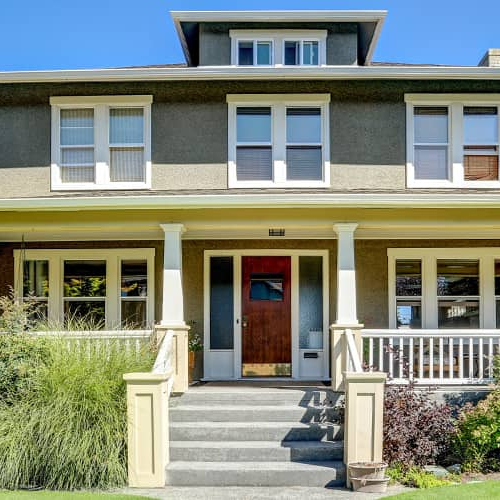How much do you need for a down payment on a house?
Contributed by Karen Idelson
Jan 27, 2026
•6-minute read

Key takeaways
- Down payment requirements vary widely by loan type. Depending on the mortgage, you may need anywhere from 3% to 20% or more when purchasing a home.
- Larger down payments can reduce long‑term costs. Putting 20% or more down can help you avoid private mortgage insurance (PMI) and may qualify you for a lower interest rate, though it requires more upfront cash.
- Minimum down payments depend on the mortgage program. VA and USDA loans offer no down payment requirement, FHA loans typically require 3.5%–10% and conventional loans often start at 3%–5%.
Important Legal Disclosure:
Any figures, interest rates, loan examples, and market data referenced in this article are hypothetical or aggregated for educational purposes only. They are ot intended to reflect current pricing, available terms, or personalized loan options for any consumer. This content does not constitute an advertisement of credit terms, a solicitation or offer to extend credit, or a rate quote under federal or state lending laws. Actual mortgage rates and terms are determined by individual financial qualifications, property characteristics, market conditions, and other factors, and are subject to change without notice.
If you are seeking current, real-time mortgage rate information please refer to the official live rate information and product details published at RocketMortgage.com/rates, where current pricing and various loan terms are made available.
First-time home buyers may assume they need a 20% down payment to buy a home. For most mortgage types, that’s no longer the case.
While there are benefits associated with a 20% down payment, such as avoiding private mortgage insurance (PMI), most loan options allow down payments in 3% - 5% range.
You also use our free down payment calculator to see how your down payment affects your monthly mortgage payment.
We’ll walk you through some of the options in this article.
What is a down payment?
The down payment is the amount you pay toward the purchase price of a home. It’s usually expressed as a percentage of the purchase price.
For example, if the price tag on a home is $300,000, a 3% down payment is $9,000, and a 20% down payment is $60,000.
When you apply for a mortgage, your lender usually will require a down payment. The down payment is determined by the loan-to-value (LTV) ratio, which determines how much of the home’s value you can borrow.
For example, if your lender has an LTV ratio of 95% and you want to buy a home valued at $400,000, the most you could borrow is 95% of the loan or $380,000. You’d be responsible for the remaining 5%, which means you need a down payment of $20,000.
While down payment minimums range from 3% to 5% for most loan types, a larger down payment can improve your chances of approval and may get you a lower mortgage rate.
Minimum down payments by loan type
According to a 2024 National Association of REALTORS® study, the median down payment on a home for all home buyers was 18%. For first-time home buyers, it was 9%.
The minimum down payment depends on the type of loan. VA and USDA loans have no down payment requirement but are not available to all borrowers. You also will want to factor in closing costs, which typically total 3% – 6% of the loan amount, and other expenses associated with buying a home.
Here are the minimum down payment and other loan requirements by mortgage type.
|
Property type |
Loan type |
Minimum down payment |
Requirements |
|
Primary residence |
Conventional |
3% (fixed-rate mortgage) 5% (adjustable-rate mortgage) |
Minimum credit score: 620 |
|
|
FHA |
3.5%
|
Minimum credit score: 580 Maximum DTI: 50%
|
|
|
VA |
None |
Minimum credit score: 620 |
|
|
USDA |
None |
Minimum credit score: 640 |
|
|
|
|
|
|
Secondary residence |
Conventional |
10% |
Minimum credit score: 640 |
|
Investment property |
Conventional |
15% |
Minimum credit score: 680 |
Conforming conventional loan
A conforming conventional loan meets specific requirements set by the Federal Housing Finance Agency. Lenders can sell loans that meet these requirements to Fannie Mae and Freddie Mac, which are government-sponsored enterprises that package mortgages into investments sold on secondary markets.
For 2025, the baseline conforming loan limit for a one-unit home is $806,500. There is a higher limit of $1,209,750 that applies in counties where housing costs are more expensive.
The minimum down payment for a conforming conventional loans is 3% if you have a fixed-rate mortgage and 5% if you choose an adjustable-rate loan.
You must pay for PMI if your down payment is less than 20%. You can cancel PMI payments once you’ve built 20% equity in your property.
Federal Housing Administration loan
An FHA loan, which is designed for first-time home buyers, has a minimum down payment that depends on your credit score.
If you have a credit score of at least 580, you’ll need a down payment of at least 3.5% of its purchase price. However, if your credit score falls between 500 and 579, you will need a minimum down payment of 10%.
Rocket Mortgage requires a credit score of at least 580 and minimum down payment of 3.5% for an FHA loan.
With an FHA loan, you’ll pay a mortgage insurance premium (MIP) based on how much you borrow and the size of your down payment.
Department of Veterans Affairs loan
VA loans are available only to active-duty military personnel, veterans, and their surviving spouses.
VA loans require no minimum down payment.
While the VA sets no minimum credit score requirement, lenders often set their own limit of at least 620. The DTI ratio is capped at 41%.
U.S. Department of Agriculture loan
USDA loans also don’t set a minimum down payment requirement. However, if you have assets higher than the listed asset limits, you might need to offer a portion of these assets to purchase your home.
Lenders typically require a minimum credit score of 640. If your score is lower, the lender may request reference letters and verification that you pay rent on time and in full.
Currently, Rocket Mortgage doesn’t offer USDA loans.
Jumbo loan
If you need to borrow more than the conforming loan limit, you need a jumbo loan.
Lenders are free to set their own requirements and conditions for jumbo loans. That may include a higher interest rate and down payment requirement.
Lenders may require a down payment of at least 10% up to 30% in some cases. If you put less than 20%, you’ll have to pay PMI.
Down payment examples
Let’s examine how your down payment can influence the finances of buying a home.
Let’s say you’re buying a home priced at $420,000 with a 30-year fixed-rate mortgage at 7% interest. Here’s how various down payment amounts affect your financing.
|
Down payment as a percentage |
3% |
5% |
10% |
20% |
|
Down payment amount |
$12,600 |
$21,000 |
$42,000 |
$84,000 |
|
Loan amount |
$407,400 |
$399,000 |
$378,000 |
$336,000 |
|
Monthly payment |
$2,710 |
$2,655 |
$2,515 |
$2,235 |
|
Total interest paid |
$568,359 |
$556,641 |
$527,344 |
$468,750 |
|
Total cost of the loan |
$975,759 |
$955,641 |
$905,344 |
$804,750 |
Benefits of making a larger down payment
Making the best choice for your unique scenario can help with your finances and make you feel more confident about your decisions. First, we’ll start with the pluses of making a down payment that’s on the larger end.
- Avoid PMI. Putting down 20% or more of the purchase price on a conventional loan allows you to get rid of PMI. The amount you save varies, but PMI adds 0.3% to 2.0% to your loan each year.
- Lower interest rates. Making a larger down payment can get you a lower interest rate, which reduces your monthly payment and save you a lot on interest over time.
- Lower monthly payments. The more money you put down on the purchase of your home, the less you’ll borrow, which lowers your monthly mortgage payments.
- Competitive edge over other buyers. In a hot market, offering a larger down payment can make your offer more appealing to sellers. In turn, it can increase your chances of accepting your offer over other interested potential home buyers.
Drawbacks of making a larger down payment
Now, we’ll go over some of the potential downsides of a larger down payment.
- Less financial flexibility. A larger down payment can tie up your cash and leave you with less money for other expenses, such as home repairs and maintenance.
- More time is required to save. It takes more time to save a 20% down payment for your home. This can delay your purchase and potentially increase the cost, thanks to rising prices and rent.
Buying a second home or investment property
If you’re in a solid position to buy a second home or investment property, you’ll need to consider different down payment minimums.
Down payment on your secondary residence
If you want a conventional loan for a second home, you’ll need a minimum down payment of 10%, a 640 credit score, and a 45% DTI ratio. FHA loans, VA loans, and USDA loans can’t be used to buy a second home.
Down payment on your investment property
Down payments on investment properties tend to be higher. On a single-unit property, you can expect a 15% down payment. On a multi-unit property, the required down payment is generally a minimum of 25%.
FHA, VA, and USDA loans can’t be used for investment properties.
Sometimes, you can use a VA or FHA loan if you live in one unit or a multifamily home, such as a duplex, townhouse, apartment complex, or semi-detached house. Your second home must also be used as a primary residence for VA loans. That means you eventually plan to move into it at some point in the future. Most lenders will require a down payment of 15% to 30%, depending on your credit score, DTI, the type of property you’re buying, the type of loan you secure, and other factors.
FAQ
Here are some frequently asked questions to help you figure out how much to put down on a house.
What is the standard down payment on a house?
There’s no standard down payment on a house. However, a 20% down payment is sometimes considered the traditional down payment. The minimum down payment depends on the type of loan.
Can I get down payment assistance?
Yes. Down payment assistance programs can help eligible buyers afford a home through grants, loans, and other support. To qualify, you’ll want to pay close attention to standard criteria like the minimum credit score, DTI ratios, and income limits.
The bottom line: Down payments affect monthly payments
How much you put down on a house largely depends on your situation. By learn more about different types of loans and their requirements, and being specific about your personal preferences and budget, you’ll be able to choose the mortgage that fits your budget and goals.
Ready to start your home buying journey? You can start your application with Rocket Mortgage today.

Jackie Lam
Jackie Lam is a seasoned freelance writer who writes about personal finance, money and relationships, renewable energy and small business. She is also an AFC® financial coach and educator who helps creative freelancers and artists overcome mental blocks and develop a healthy relationship with their finances. You can find Jackie in water aerobics class, biking, drumming and organizing her massive sticker collection.
Related resources

10-minute read
How much house can you afford?
Ever asked, “How much house can I afford?” Determine how much you can spend on a mortgage with help from the Rocket Mortgage home affordability calc...
Read more
4-minute read
First-time home buyers and down payments: 73% of buyers put down less than you think
Many believe they need a 20% down payment to buy a house, but is that true? Let’s look at the actual data surrounding first-time home buyers and down p...
Read more

8-minute read
How much money do you need to buy a house?
How much money you need to buy a house depends on factors like purchase price, loan terms, and where you are buying. Here’s how to prepare yourself financ...
Read more